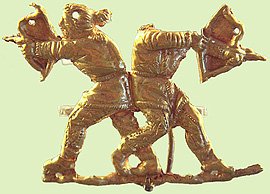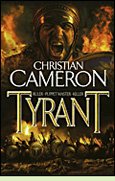|
Tyrantby Christian CameronReviewed by Annis
Young Athenian aristocrat Kineas belongs to an elite Greek Companion cavalry unit fighting under Alexander’s command during his successful campaign in Asia Minor against the Persian Empire. Kineas distinguishes himself in action at the Battle of Issus in 333 B.C., winning Alexander’s favour. For six years he rides with the charismatic Macedonian king, only to be rewarded with a curt dismissal at the war’s end. The Tyrant Leucon hires Kineas to turn the men of his city into an effective army. Leucon is absolute ruler of Olbia, a Greek trading centre on the shores of the Euxine (today’s Black Sea), made rich by trade with the nomadic Scythian tribes of the Sea of Grass - the Eurasian steppes. It won’t be an easy task. Kineas must win over a hostile, disparate group; mercenaries, haughty gentlemen landowners, wealthy merchants, smallholders and poor townsmen, united only in their resentment of the Athenian captain and his companions. Olbia simmers with political intrigue and rumours of imminent invasion by a host fielded by Antipater, Alexander's regent in Macedonia. But no one knows better than Kineas how to beat the Macedonians. He's a leader who inspires love and loyalty, and a gifted strategist. He also has a formidable ally in Satrax, king of the Scythian warrior horsemen with whom Kineas feels a strong affinity. Can Greeks and Scythians put aside their mutual suspicion and together thwart the Macedonian juggernaut that threatens both? Although a military adventure, Tyrant’s vividly realised ancient world with its many races and cultures encompasses not only the machinery of war, but also politics, social structures, philosophy, and religion. It is peopled by strong, sympathetic characters whose fate quickly arouses compulsive interest. (2008; 400 pages, including a glossary of Greek terminology) See listing for Tyrant at Powell's Books or Amazon.com
#2: Storm of Arrows (2009). More info #3: Funeral Games (2010). See review or more info at Amazon.com

The Gathering of the Storm by William Napier (2007), #2 in the Attila series. More info Lion of Scythia by Max Overton (2004). More info
Classical Olbia and the Scythian World edited by David Braund (2008). More info The Scythians, 700-300 B.C. by E.V. Cernenko (1983), #137 in the Osprey Men at Arms series. More info Alexander the Great: His Armies and Campaigns, 334-323 B.C. by Nick Sekunda (1998). More info
The Scythians at the Lost Civilizations website
Back to Novels of Ancient History
|
